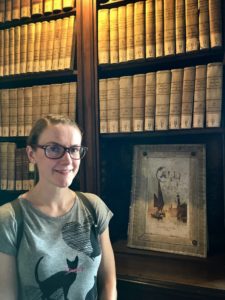Laura Dobie, Knowledge and Information Skills Specialist, Healthcare Improvement Scotland
Category: Meet our Members
This blog is part of our Meet Our Members series, focusing on different members and their careers.
My name is Laura Dobie, and I’m a Knowledge and Information Skills Specialist at Healthcare Improvement Scotland. My role comprises a broad range of activities, including: developing evidence resources to support improvement work, writing up work for publication in peer reviewed journals and other publications, writing conference abstracts, designing conference posters, and promoting our work through social media.
I studied English Literature and French at the University of Glasgow, and did a Postgraduate Diploma in Information and Library Studies at the University of Strathclyde.
My job
The past few months have been focused on work to support COVID-19 resilience. Recently my team has been organising regular webinars to share learning around hospital at home services, and I have been producing webinar summaries to support this and sharing relevant research and information with the network. We are using MS Teams for our webinars, and are now exploring how we could use the one platform to communicate with the network and share documents and webinar recordings.
What I enjoy most about my job is the opportunity to be creative! Presenting information visually can help to support decision making, and I have enjoyed producing tables, summaries and visual abstracts, which have been useful for our improvement projects. However, I’m a bit limited in what I can do with the software that I have, and transferring large files is always a bit of a challenge!
I work as part of the Living Well in Communities team in Healthcare Improvement Scotland’s Improvement Hub. It’s a fairly large team with a broad range of roles, and I have learned a lot from my colleagues, building up experience in quality improvement work, and project management skills.
Experience from another sector
I previously worked as a Research Officer for the Idox Information Service, a subscription library service covering subjects relevant to local government, such as planning, public health, transport and social work. It allowed me to develop experience in a broad range of areas: abstracting, stock selection, literature searching, writing research briefings, social media, and publication layout and design.
I also used to deliver regular training sessions for members on how to search the information service database, and information literacy. I really enjoyed travelling and getting to meet the members!
How my CILIP membership helps me in my role
I learned a lot through the chartership process, and it helped me to progress to the role that I am in now. CILIP membership helps me to keep abreast of developments in different library sectors, and expand my learning in different directions – I particularly enjoyed the webinar on natural language processing.
Tips for getting into the role
Apply! Even if you don’t think that you have all of the skills that are listed in the job description. Women in particular are more diffident about their abilities and less likely to apply for a role unless they feel that they meet all of the criteria. You could well have more of a chance than you think. Previously I was a bit risk-averse when it came to temporary and part time roles, but these can often be a stepping stone to full time, permanent positions.
The first Knowledge and Information Skills Specialist role that I applied for at Healthcare Improvement Scotland was a part time, temporary position. At the time, I didn’t feel that I had all the skills that were required to do the job, but working in this role part time while reducing my hours in my other job allowed me to build up invaluable experience, which helped me to get a full time, permanent position when it came up.
Good communication and digital skills will stand you in good stead – it will really help if you are able to demonstrate that you can communicate well with a variety of audiences, and that you can find your way around different website content management systems. I’ve been taking this even further by learning coding in my spare time!
